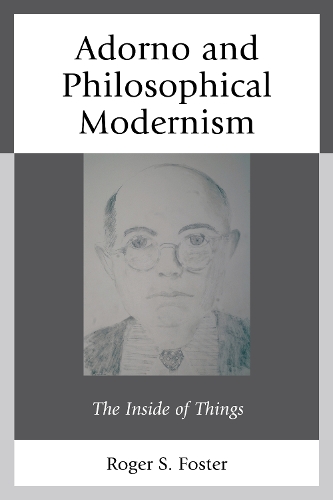
Adorno and Philosophical Modernism: The Inside of Things
(Paperback)
Available Formats
Publishing Details
Adorno and Philosophical Modernism: The Inside of Things
By (Author) Roger S. Foster
Bloomsbury Publishing PLC
Lexington Books
23rd March 2018
United States
Classifications
Professional and Scholarly
Non Fiction
193
Physical Properties
Paperback
270
Width 152mm, Height 230mm, Spine 25mm
399g
Description
Adorno and Philosophical Modernism: The Inside of Things offers an original interpretation and vigorous defense of Theodor Adornos idea of philosophy as the practice of what Roger Foster calls philosophical modernism. Adornos philosophical writings, from the early 1930s to the mature works of the late 1960s, are deeply informed by a distinctively modernist vision of human experience. This book seeks to establish that Adornos unique and lasting contribution to philosophy consists in his sustained and rigorous development of this modernist vision into an encompassing practice of philosophical interpretation. The essential features of this vision can be discerned in all of Adornos major writings in philosophy, social theory, and aesthetics. Its defining element is the idea of a pattern underlying ordinary experience, which, although not directly accessible, can be disclosed by the reconstructive work of philosophical or literary language. This vision, Foster argues, can be discerned in the major works of literary modernism (including Woolf, Proust, and Musil) as well as in the interpretive technique of psychoanalysis developed by Sigmund Freud. The importance of Adornos contribution to twentieth-century philosophy can only be fully appreciated by understanding how he developed this vision into an overarching practice of philosophical interpretation that furnished a coherent and profound response to the decay of experience afflicting late-modern societies. In this book, Foster expounds that interpretive practice, exploring its ramifications and, in particular, its relation with literary modernism, and places it in critical dialogue with alternative philosophical responses.
Reviews
In many respects, Fosters study can be seen as a sequel or companion volume to his important Adorno: The Recovery of Experience (CH, Jun'08, 45-5498). Whereas that book focused on the philosophical context of Adornos work, this study embraces a culturally broader view of what Foster (Borough of Manhattan Community College, CUNY)terms philosophical modernism. Foster expands this discussion to consider literary modernism, focusing on such figures as Yves Bonnefoy, Robert Musil, and Virginia Woolf. The book as a whole, however, is carefully grounded in Adornos philosophy. Indeed, the author has mined the full corpus of Adornos work for this project, even incorporating detailed discussion of Adornos engagement with Heidegger. Foster argues that, for Adorno, the meansbe they philosophy, literature, or language itselfto come to terms with experience in the context of modernism are no longer adequate to the task. As a result, the only meaningful response is a philosophy (or literature) that embraces an interpretive practice that seeks to account for this very inadequacy. This is a rewarding study that does justice to its challenging subject. Summing Up: Highly recommended. Upper-division undergraduates through faculty. * CHOICE *
Roger Foster has written an ambitious, timely, unique, and useful book on the work of German thinker Theodor W. Adorno.... [M]y aimas Fosters book also aims and accomplishesis to highlight the continuing relevance of Adornos work for our present moment and, indeed, for the history of philosophy from Kant onward; this book is a welcome addition to that undertaking. * The Journal of Aesthetics and Art Criticism *
In complex yet stimulating and often path-breaking readings of Adorno's philosophy, and with breathtaking accounts of such writers as Bonnefoy, Musil, and Woolf, Foster addresses the late modern condition from the vantage-point of experience. As our lifeworld gets increasingly commodified, digitalized and instrumentalized, the need for a reconsideration of what authentic experience demands has never seemed more timely. For readers interested in the intersection between philosophy, literature and the question of modernity, this book is bound to be a unique resource. -- Espen Hammer, Temple University
Author Bio
Roger Foster teaches philosophy at the Borough of Manhattan Community College, CUNY.
